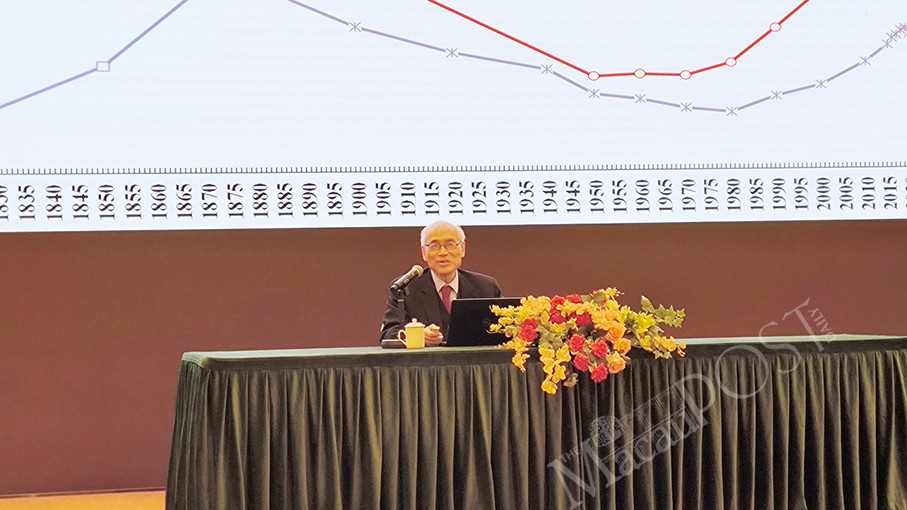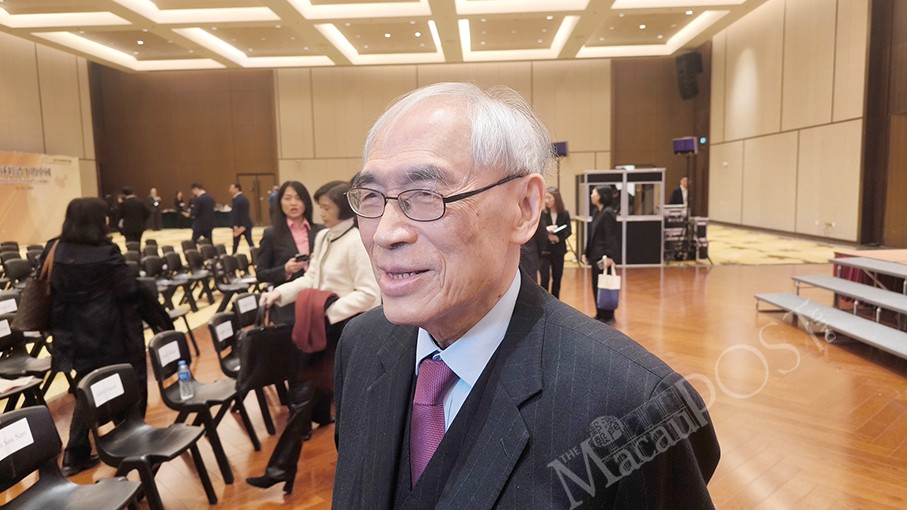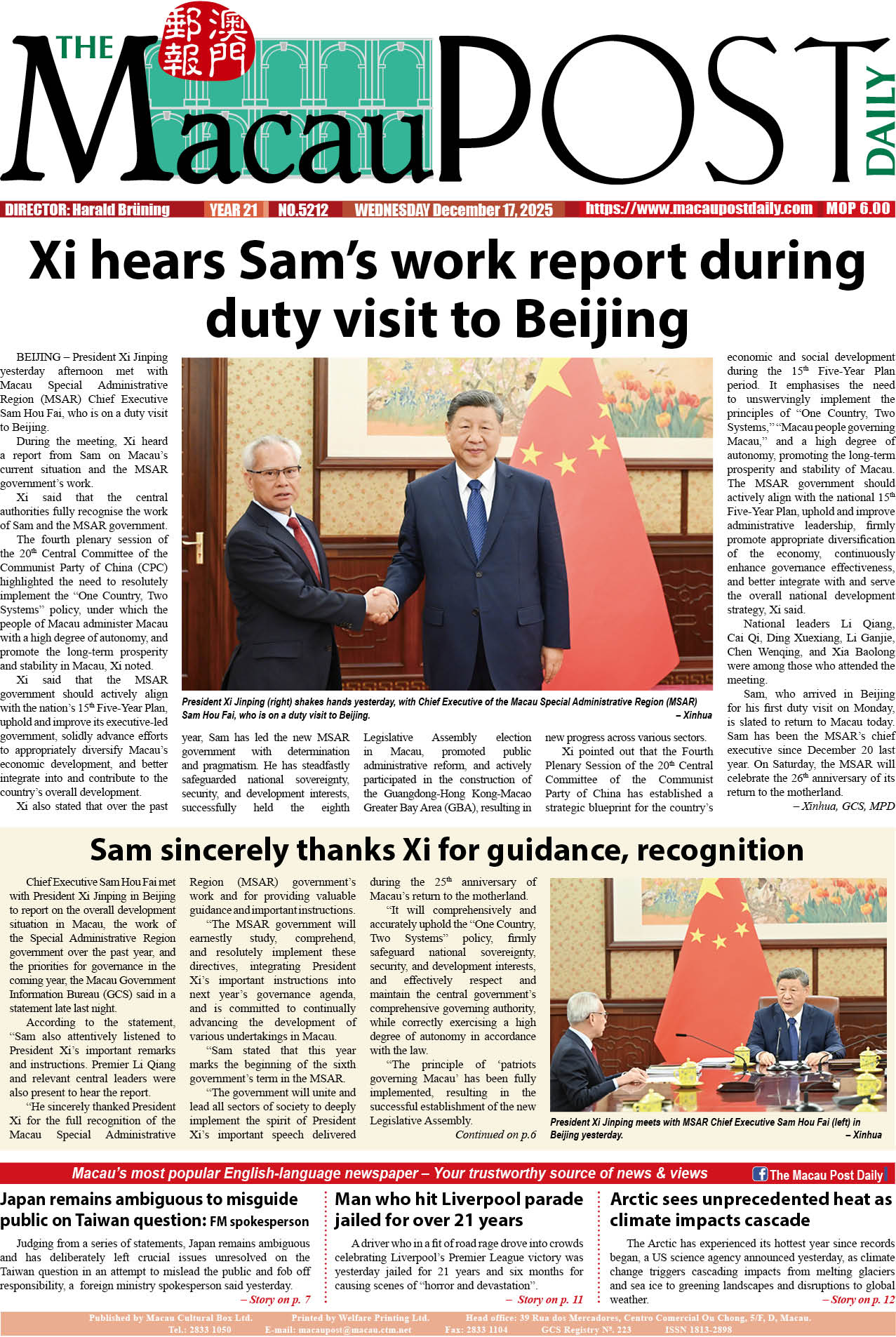Hong Kong’s renowned economist Lawrence Lau Juen-yee, whose main research fields includes the Chinese economy, said in Macau yesterday he suggests that the mainland create additional aggregate demand with the aim of stimulating its economic growth, such as by increasing public investment, including extending its current nine-year compulsory education to 12 years, a policy requiring the construction of “many” new school buildings which would help boost the construction sector.
Lau also said that right now it was important for the central government to boost people’s relatively low expectations of the country’s economic growth prospects.
Lau, 80, made the remarks while delivering a talk on “China in the Global Economy” held on the University of Macau (UM) campus and talking to reporters afterwards.
Lau was born in Guizhou province and grew up in Hong Kong where he received his school education. He received his bachelor’s degrees in Physics and Economics from Stanford University in 1964, and his master’s degree and doctoral degree in Economics from the University of California, Berkeley in 1966 and 1969 respectively.
Lau started to teach in Stanford University’s Department of Economics in 1966 where he was promoted to professor of economics in 1976.
Lau moved back to Hong Kong in 2004 to take up the position of vice-chancellor and president of the Chinese University of Hong Kong (CUHK), which he had held until 2010, where he is currently a chair professor of economics.
In his talk lasting one and a half hours, including a Q&A session, Lau summarised and elaborated on China’s economic development history since the 19th century by highlighting key facts and indicators in different historical periods and eras.
Concerning how to stimulate people’s consumption in the mainland, Lau said that the level of people’s expectations of the country’s economic growth prospects was a key factor determining their willingness to spend money.
Lau said that people’s expectations of economic prospects was a “self-fulfilling prophecy”, which refers to a phenomenon where if people believe the economy will improve, their increased spending and investment can lead to actual economic growth, while conversely if people expect economic decline, their reduced spending and investment can contribute to a slowdown.
A self-fulfilling prophecy occurs when a belief or expectation about a future event influences behaviours in such a way that it ultimately causes that event to happen.
Lau suggested that the central government roll out special measures aiming to boost people’s expectations of the country’s economic growth prospects.
Lau cited three previous successful examples where the central government was able to restore or raise people’s expectations when the mainland was affected by pressure potentially causing an economic downturn, namely Deng Xiaoping’s famed southern tour in 1992 after the country’s economic prospects were affected by the aftermath of the June 4 incident in Beijing in 1989, as well as the 1997 Asian financial crisis and the 2008 global financial crisis.
Lau, who delivered his talk in English, spoke to local English-language media afterwards, including the Post, noting that the aftermath of the three-year COVID-19 pandemic has negatively affected people’s consumption ability and enterprises’ ability to invest, because of which, he said, the additional aggregate demand to be created by the central government needed to primarily come from government-generated investment.
“Extra domestic demand basically has to come, in the first instance, from investment, the government one, and not from private consumption. As you know, due to the three-year COVID-19, households and enterprises have not been making money. What do you expect them to do? So, I think, in the first instance, the extra demand has to be government-generated,” Lau said.
Lau said he suggests that the central government extend the mainland’s current nine-year compulsory education to 12 years with the aim of boosting public investment-generated aggregate demand.
“I suggest the extension to 12-year mandatory education. This means you have to construct many more senior high schools, and that’s the demand. You need new schools for the expanded senior high school education, and apparently quite a few. Because I think maybe a quarter to a third of the people in this age cohort right now still do not attend senior high school,” Lau said.
“So, there are a lot of schools and student dormitories that will [require] construction materials, contractors and so forth,” Lau said.
“This would actually replace the demand lost because of the property developers going under,” he said.
Lau underlined that the major thing currently negatively affecting the mainland’s economic growth is its insufficient aggregate demand, pointing out that China is an economy with surplus supply where production capacity is in excess.
“No question about it. So, [US Secretary of the Treasury] Janet Yellen was quite right,” he said.


Hong Kong’s economist Lawrence Lau Juen-yee yesterday speaks in the University of Macau (UM) and to reporters afterwards. – Photos: Tony Wong







